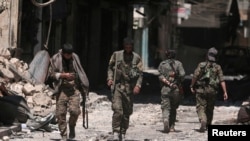From his tent in a displaced-persons camp in northwest Syria, Motaz has been watching Russia's invasion of Ukraine with one thing in mind.
"I can almost see the same thing that happened to us a few years ago happening to these innocent Ukrainians as well," said the 37-year-old native of Aleppo, who gave only his first name.
Motaz and his family fled Aleppo in late 2016, as Syrian air force and Russian planes bombed the eastern outskirts of Syria's second-largest city to drive out rebels. They, along with hundreds of thousands of other residents of eastern Aleppo, are being sheltered in several Syrian camps as well as refugee camps in neighboring countries.
Throughout Syria's decadelong conflict, Russia has been a staunch supporter of the government. Moscow's formal military engagement in Syria's war in 2015 has been said to have aided Syrian President Bashar al-Assad's forces in reclaiming much of the territory previously held by rebel groups.
The recapture of eastern Aleppo and other rebel-held areas in Syria came at a heavy cost for the civilian population.
Since then, many rights groups and international bodies have accused Syrian government forces and their Russian allies of targeting Syrian civilians across the war-torn country.
"We watched in real time how Russia's war machine destroyed our homes, schools and hospitals," Motaz said. "That's why I'm afraid they would repeat the same thing against civilians in Ukraine."
More evidence of the destruction of civilian infrastructure and mounting civilian casualties has emerged since Russia launched its invasion of Ukraine a week ago. More than 2,000 civilians have been killed in the battle, according to the Ukrainian government.
Russian airstrikes targeted civilian infrastructure in multiple Ukrainian cities on Tuesday, primarily in Kyiv, the country's capital, and Kharkiv, the country's second-largest city.
The Pentagon expressed alarm Wednesday about Russia's increasingly aggressive behavior in Ukraine that is further endangering civilians and civilian infrastructure.
According to the United Nations, 1 million people have fled Ukraine in the past week alone.
The Syria playbook
According to experts, in its attack on Ukraine, Russia is employing practically all the military tactics it used in Syria.
"These methods are essentially from the same playbook, which includes shelling residential areas, targeting schools and destroying hospitals," said Ahmed Rahal, a former Syrian army general who works as a military analyst in Istanbul, Turkey.
"For someone like [Russian President Vladimir] Putin, achieving their goals is the only thing that matters. He doesn't care if civilians are killed or civilian infrastructure are destroyed. In fact, he would do so if it helps him achieve his military objectives," he told VOA.
The only difference, Rahal said, is that the West is actively watching Russia's military moves in every part of Ukraine, "which could put some restrictions on how Moscow deals with civilian targets."
"In Syria, many places in Aleppo, Idlib, Homs and elsewhere were leveled to the ground because Russian strikes largely were unchecked," he said. "But in Ukraine, the fact that Western leaders and media are thoroughly following what Russia does could potentially help reduce the scale of Russia's atrocities against civilians."
Key similarities
Anna Borshchevskaya, an expert on Russian policy in the Middle East at the Washington Institute for Near East Policy, agrees that there are key similarities between Russia's military activities in both conflicts.
"First, it is Russia's focus on use of aerospace forces. In Syria, Russia executed a primarily aerial campaign, with a naval component. Though in Ukraine there are far more boots on the ground, and overall, this is a far bigger invasion that the Syria intervention, these broader elements are still there. They demonstrate the evolution of Russia's way of war that incorporates lessons learned from past failures," she told VOA.
Borshchevskaya, the author of the 2021 book Putin's War in Syria, said the targeting of civilian population is another key element.
"In Syria, Putin helped Assad carpet-bomb his citizens, terrorize them into submission," she said. "We are seeing these same elements emerge now, with Russia's increased aerial bombardments of key cities, which raise the question of, will Kyiv, for instance, turn into another Aleppo?"
This story originated in VOA's Kurdish Service.






